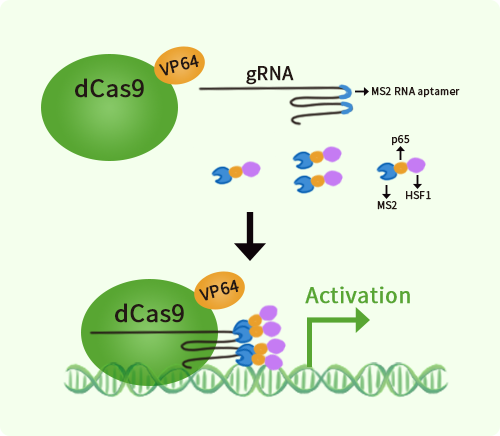Human MYT1L activation kit by CRISPRa
CAT#: GA107992
MYT1L CRISPRa kit - CRISPR gene activation of human myelin transcription factor 1 like
CNY 12,255.00
Specifications
| Product Data | |
| Format | 3 gRNAs (5ug each), 1 scramble ctrl (10ug) and 1 enhancer vector (10ug) |
| Symbol | MYT1L |
| Locus ID | 23040 |
| Kit Components | GA107992G1, MYT1L gRNA vector 1 in pCas-Guide-GFP-CRISPRa GA107992G2, MYT1L gRNA vector 2 in pCas-Guide-GFP-CRISPRa GA107992G3, MYT1L gRNA vector 3 in pCas-Guide-GFP-CRISPRa 1 CRISPRa-Enhancer vector, SKU GE100056 1 CRISPRa scramble vector, SKU GE100077 |
| Disclaimer | These products are manufactured and supplied by OriGene under license from ERS. The kit is designed based on the best knowledge of CRISPRa SAM technology. The efficiency of the activation can be affected by many factors, including nucleosome occupancy status, chromatin structure and the gene expression level of the target, etc. |
| Reference Data | |
| RefSeq | NM_001303052, NM_001329844, NM_001329845, NM_001329846, NM_001329847, NM_001329848, NM_001329849, NM_001329851, NM_001329852, NM_015025 |
| Synonyms | MRD39; myT1-L; NZF1; ZC2H2C2; ZC2HC4B |
| Summary | This gene encodes a member of the zinc finger superfamily of transcription factors whose expression, thus far, has been found only in neuronal tissues. The encoded protein belongs to a novel class of cystein-cystein-histidine-cystein zinc finger proteins that function in the developing mammalian central nervous system. Forced expression of this gene in combination with the basic helix-loop-helix transcription factor NeuroD1 and the transcription factors POU class 3 homeobox 2 and achaete-scute family basic helix-loop-helix transcription factor 1 can convert fetal and postnatal human fibroblasts into induced neuronal cells, which are able to generate action potentials. Mutations in this gene have been associated with an autosomal dominant form of cognitive disability and with autism spectrum disorder. Alternative splicing results in multiple variants. [provided by RefSeq, Jul 2017] |
Documents
Resources
| 基因表达相关资源 |
Other Versions
| SKU | Description | Size | Price |
|---|---|---|---|
| KN421586 | MYT1L - KN2.0, Human gene knockout kit via CRISPR, non-homology mediated. |
CNY 8,680.00 |


 United States
United States
 Germany
Germany
 Japan
Japan
 United Kingdom
United Kingdom
 China
China

